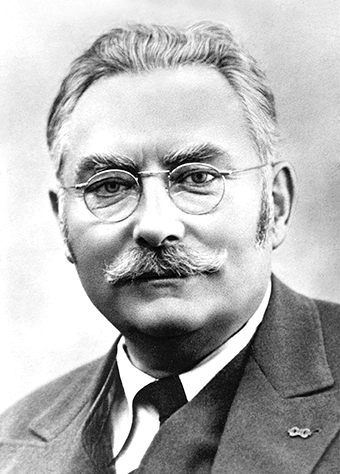|
Ludwig-Schunk Stiftung
The Ludwig-Schunk-Stiftung (Ludwig Schunk Foundation) is a private foundation in the Central Hesse town of Heuchelheim, operated as a registered association. Its founding resulted from the last will and testament of the entrepreneur and company founder Ludwig Schunk (1884–1947). The Foundation holds one hundred percent of the registered capital of thSchunk Group Objectives The Foundation has on the one hand trusteeship tasks in connection with execution of Schunk's testament while on the other hand being the owner of capital and, with the support of Schunk GmbH, manager of the corporate group. The trusteeship tasks are mandated by the testament. By virtue of its preamble and corporate charter objective the Ludwig-Schunk-Stiftung is also formally bound by the corresponding requirements of the testament. This also includes promotion of and support to scientific and social institutions. For promotion of future generations of scientists, in conjunction with the firm of Pfeiffer V ... [...More Info...] [...Related Items...] OR: [Wikipedia] [Google] [Baidu] |
Ludwig Schunk
Ludwig Schunk (May 1, 1884, in Frankfurt – May 10, 1947, in Heuchelheim near Giessen) was a German manufacturer and cofounder of the firm of Schunk und Ebe oHG. Biography Schunk und Ebe oHG was founded in 1913 as a factory for production of carbon brushes for dynamos and electric motors in Fulda in Hesse and moved in 1918 to Heuchelheim near Giessen. By now the company has developed into being the Schunk Group, a technology concern with worldwide operations. Ludwig Schunk's forebears had been settled in the Central Hesse region since the middle of the 18th century and for several generations had been nail makers in Büdingen. His grandfather had still exercised that craft. Ludwig Schunk's father, as the youngest of three children, saw practically no possibility of ever being able to take over his father's workshop and moved to Frankfurt where, among other things, he worked in a graphic art firm. Ludwig Schunk grew up as the younger of two children in what were modest circumsta ... [...More Info...] [...Related Items...] OR: [Wikipedia] [Google] [Baidu] |
Heuchelheim
Heuchelheim (official name: ''Heuchelheim a. d. Lahn'') is a municipality in the district of Gießen, in Hesse, Germany Germany,, officially the Federal Republic of Germany, is a country in Central Europe. It is the second most populous country in Europe after Russia, and the most populous member state of the European Union. Germany is situated betwe .... Since 1 April 1967 it has included the district Kinzenbach. It has approximately 8,000 residents spread across two districts - Heuchelheim (5,800 inhabitants) and Kinzenbach (2,200 inhabitants). Until 1967 the independent villages of Heucheleim and Kinzenbach were part of other counties. In the 60s both villages cooperated leading to union in 1967. From 1977 to 1979 Heuchelheim formed part of the administrative town Lahn, a compound of Gießen, Wetzlar and other municipalities in between. References Giessen (district) {{Hesse-geo-stub ... [...More Info...] [...Related Items...] OR: [Wikipedia] [Google] [Baidu] |
Giessen
Giessen, spelled Gießen in German (), is a town in the German state (''Bundesland'') of Hesse, capital of both the district of Giessen and the administrative region of Giessen. The population is approximately 90,000, with roughly 37,000 university students. The name comes from ''Giezzen'', as it was first referred to in 1197, which refers to the position of the town between several rivers, lakes and streams. The largest river in Giessen is the Lahn, which divides the town in two parts (west and east), roughly north of Frankfurt am Main. Giessen is also home to the University of Giessen. In 1969, the town hosted the ninth ''Hessentag'' state festival. History Giessen came into being as a moated castle in 1152 built by Count Wilhelm von Gleiberg, although the history of the community in the northeast and in today's suburb called "Wieseck" dates back to 775. The town became part of Hesse-Marburg in 1567, passing to Hesse-Darmstadt in 1604. The University of Giessen was founded i ... [...More Info...] [...Related Items...] OR: [Wikipedia] [Google] [Baidu] |
